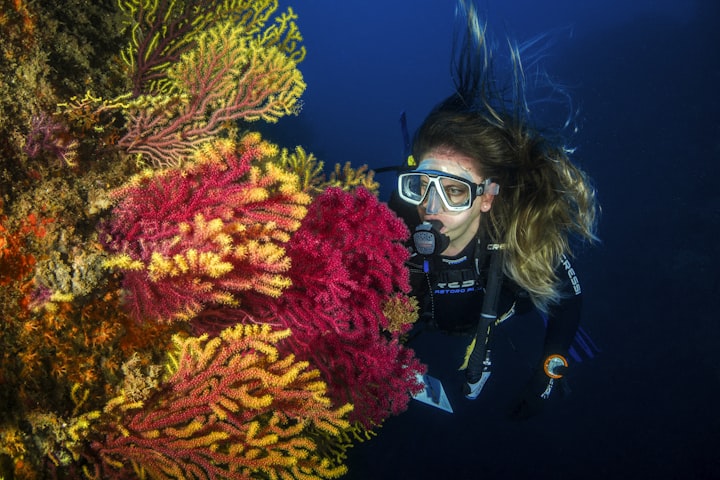
Did you ever wonder what lies beneath the surface of the water? To see things from a totally different perspective? I have always loved the idea of scuba diving, to open myself up to viewing the wonders of life underwater.
The magic of discovery has always been alluring. The thrill of exploration and the satisfaction of our curiosity are both deep-seated human drives.
But life is strange, filled with twists, turns, and obstacles of every type. Growing up in Chicago I never really had a chance to actually go scuba diving.
When I was a kid, I had a snorkel, a mask, and some fins. I was also lucky enough to have a lake nearby to explore on a limited basis because I was so entranced by the concept of underwater swimming.
But I never had the opportunity to don a scuba tank and do some real scuba diving, like in Hawaii or off the coast of California. The kind of aquatic exploration where you could experience some extended time underwater
Even still, being able to penetrate the surface of the water and dive to the bottom of the lake, and observe the fish and plants on their level like I did was very exciting. Suddenly, you are the strange exotic one. Now you can understand the ‘fish out of water’ experience to the fullest.
It was pure fun and a pleasurable adrenaline rush to me. The fins enable an unbelievable amount of extra propulsion you would have to experience to believe.
The best part is that swimming underwater is a sensation exactly like flying but without that sickening, gut-wrenching feeling of falling. When I dive under the water, I can propel myself effortlessly across the underwater terrain. I can stop and hover over any interesting aquatic features.
You can swoop down to the bottom easily, without any friction or drag just by using your arms in an easy sweeping motion and moving your legs in a lazy, controlled up and down kick, especially if you have fins on.
And since I am “flying” I can easily swoop down to examine some plant that catches my eye or swim toward a small school of fish and view them on their own terms, in their own natural environment.
Traditional swimmers are contradicting nature because they are always half in the water and half in the air. They are struggling to propel themselves with their strong arms and legs just to stay afloat and keep their heads above water.
But they are always fighting the inherent drag of gravity. It is not natural to be half in and half out of the water, struggling to stay afloat by constantly flailing and thrashing.
It is like they are fighting the water. When you are swimming underwater you are a part of the aquatic environment, in harmony with the watery element.
Scientists say we all evolved from the ocean millions of years ago, except for perhaps the smarter species like the dolphins and whales, who chose to stay in their natural aquatic world.
Dolphins and whales must surface periodically to breathe the air they need to live. They have live babies and nurse and care for their young, exactly like mammals on land. Dolphins and whales are both air-breathing mammals that don’t have gills like fish. They don’t lay eggs like fish.
Studies over the years have observed a very complex, interdependent society and hierarchy amongst dolphins and whales. They can somehow communicate with each other.
They recognize individual members of each member of their group, or pod, and also band together to fight against a common enemy like great white sharks. Sharks tend to stay away from pods of dolphins because they know they will be attacked
Don’t forget, as graphically seen from outer space and measured here on the ground, the earth is ¾ water and only ¼ land anyway! Dolphins and whales are no threat to humans, and in fact often enjoy their company, following boats around and frolicking and leaping out of the water for fun.
I don’t have the time anymore to hang out underwater with these rightful owners of their aquatic domain, for various reasons. Sigh. I do wish I had once in my life somehow found the time to take a few classes in scuba diving.
That way I could have actually experienced life under the ocean waters as a denizen of the deep, a natural part of the watery environment, instead of fighting to avoid drowning like surface swimmers always seem to be doing.
I have always wanted to explore some of the beautiful underwater coral reefs, observed some of the gorgeous natural underwater rock formations, and perhaps even check out some shipwrecks.
If you have the urge to merge with the creatures of the deep on their own turf, as a visitor to their world, there are many well-established scuba schools and trainers available to help you achieve your quest.
Like I said, life is strange, and you never know. I have actually had people tell me that they would never go swimming underwater like a scuba diver does. They fear being gobbled up by a great white shark or giant squid!
People! Be real. You face more danger just driving to work or the grocery store! Well, different strokes for different folks, as they say. Jacques Costeau, the famous French underwater explorer was always must-see tv for me.
Give it a try, what do you have to lose? I also know this: I will never forget the unbelievably exciting feeling of just swimming underwater. It made me feel like Superman! Like I was flying, but with none of the common fear reflexes of falling sensations inherent to flying.
Remember, you are supported at all times by the gravity of the water, and in a very profound and emotional way you feel deep inside like you have returned home, to your natural environment, if just for a short time.
And In A Way, You Have
About the Creator
John Whye
Retired hippie blogger, Bay Area sports enthusiast, Pisces, music lover, songwriter...






Comments
There are no comments for this story
Be the first to respond and start the conversation.